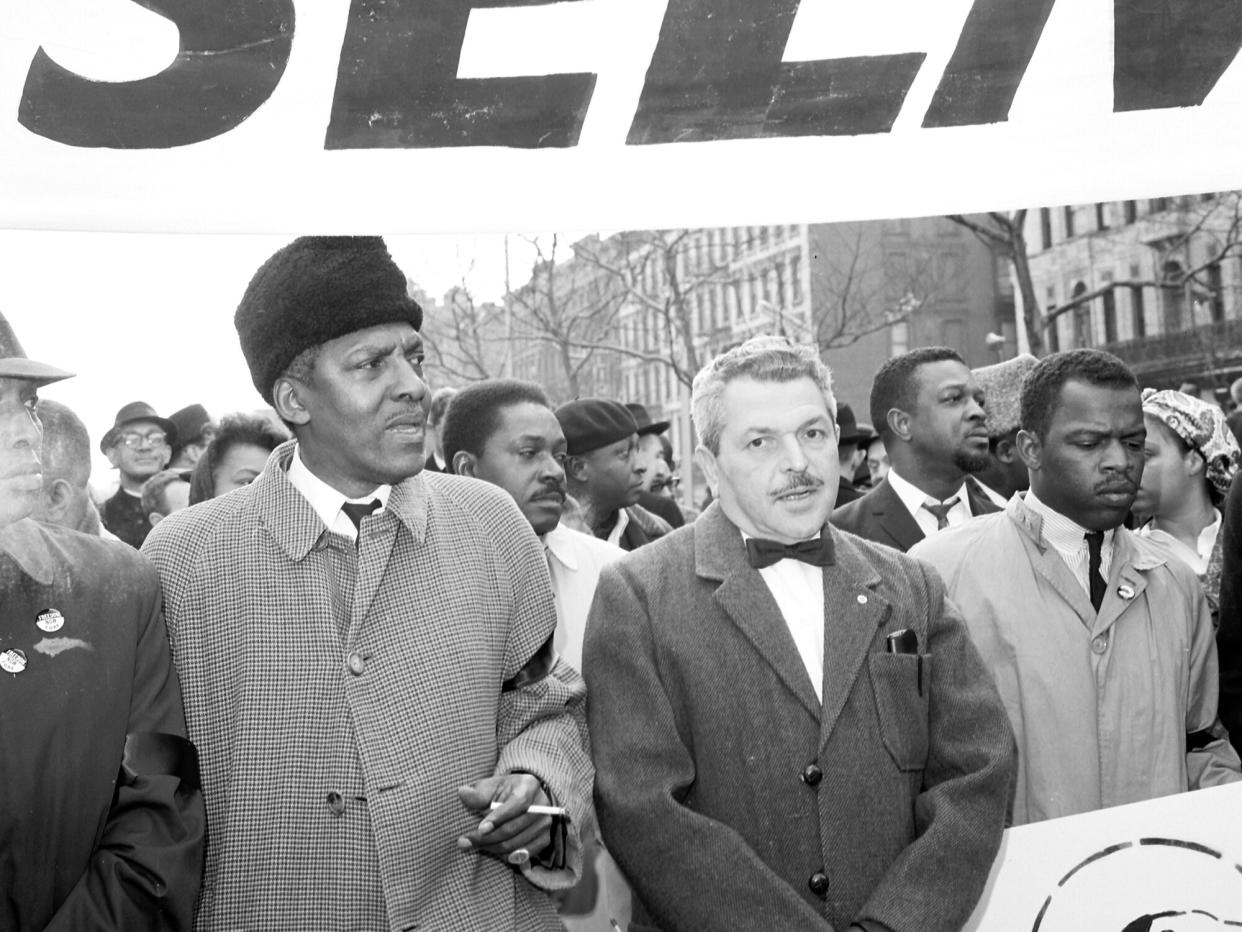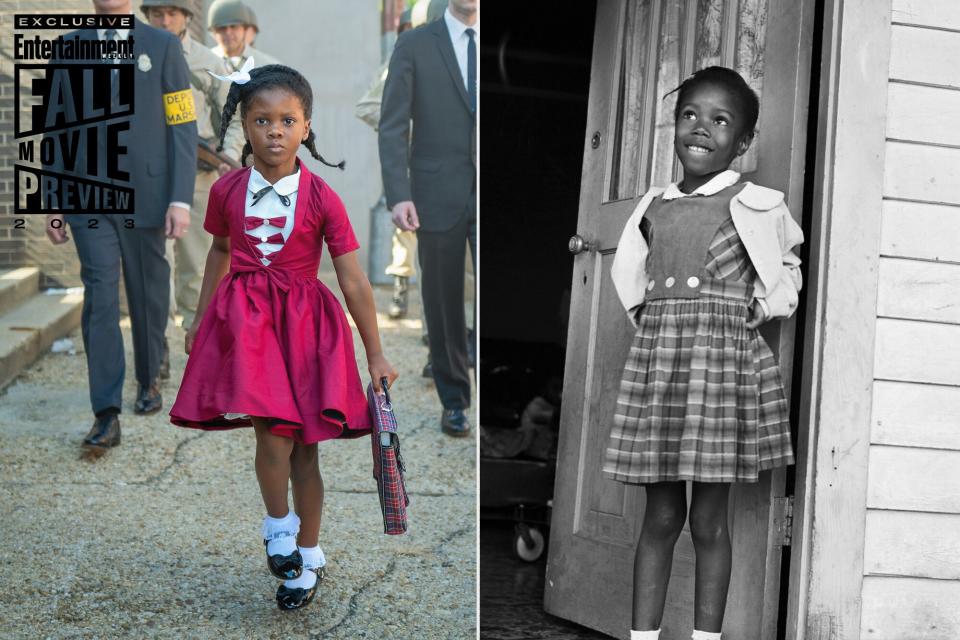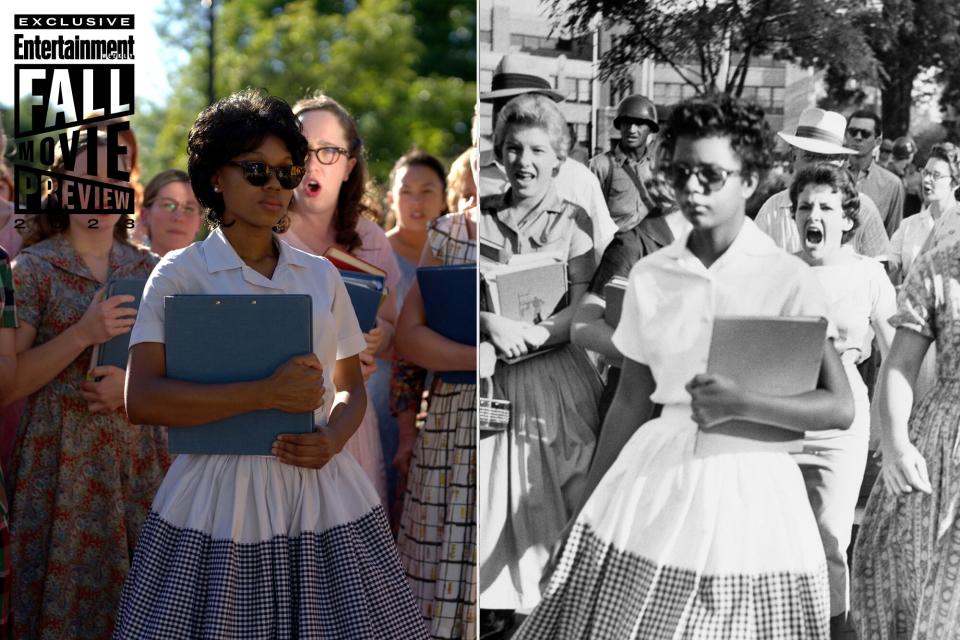“Rustin” director George C. Wolfe on recreating the March on Washington and the amazing man behind it

- Oops!Something went wrong.Please try again later.
- Oops!Something went wrong.Please try again later.
- Oops!Something went wrong.Please try again later.
Everyone knows Martin Luther King Jr. The March on Washington. The "I Have a Dream" speech. A watershed moment in the Civil Rights Movement. Kids are taught about it in schools (for now), but they usually don't learn about the man behind that monumental event in American history.
His name was Bayard Rustin, a gay Black socialist Quaker from West Chester, Pa. whose close friendship with Dr. King was the engine in the early days of the Movement. In Rustin, the new biopic (but more on that later) from Netflix, an electric Colman Domingo portrays the late civil rights leader when outside pressures surrounding his sexuality fracture his friendship with King (Aml Ameen).

Paul Demaria/NY Daily News Archive via Getty Images Bayard Rustin marches with Nathan Schwerner, whose son was killed by the Ku Klux Klan for being Jewish
Director George C. Wolfe, a five-time Tony winner who previously worked with Domingo on 2020's Ma Rainey's Black Bottom, hates the term "biopic," possibly due to its connotations or implications. As if one were merely playing at history.
"I don't respond to ['biopic'] because it doesn't make any sense," Wolfe tells EW. What did make sense to him was the story of Rustin's incredible achievement, against all odds. He not only faced resistance from the white establishment but from the Black establishment as well.
Rustin recruits a deep bench of esteemed character actors to portray pillars of the Civil Rights Movement who, despite having similar objectives, differed greatly from Rustin in method. Chris Rock plays the openly homophobic Roy Wilkins, head of the NAACP. Jeffrey Wright is Adam Clayton Powell Jr., the bombastic congressman representing Harlem who repeatedly tries to oust Rustin from his positions of power. Glynn Turman, CCH Pounder, Da'Vine Joy Randolph, and Audra McDonald round out the impressive cast.
Mr. Wolfe's protestations notwithstanding, it is important that Rustin be considered a biopic because Bayard Rustin was a real man who made a real impact on the course of American history. And he deserves the recognition that was denied him in his day — and for years, decades, afterward. Even if the man himself never sought recognition, only the rectification of centuries-old wrongs.
Here, Wolfe discusses his recreation of the 1963 March on Washington for Jobs and Freedom, working with his ensemble on one of the movie's biggest scenes, and Rustin's journey from the shadows into the light.
ENTERTAINMENT WEEKLY: How did you go about recreating the March on Washington? And what was the trickiest part about it?
GEORGE C. WOLFE: Washington, D.C., 130 degrees at the Lincoln Memorial.
One thing I did — which I think was very smart, I will say so myself — all the conversations, the big speeches, were done in Pittsburgh on a set of stairs that duplicated the steps to the Lincoln Memorial. And so what was filmed in D.C., that we filmed actually at the Lincoln Memorial, was the scale.
One of my favorite moments: When the trucks finally show up and they're unloading, there's this moment where Bayard is descending the steps of the Lincoln Memorial. And the music that is playing, which has been crafted by Branford [Marsalis], it has this symphonic sound. And then as he's descending the steps, you hear the little piano, and it's as if the steps of the Lincoln Memorial are the white keys of the piano and Bayard was playing them, and it's just a fulfillment of his arrival there.

Parrish Lewis/NETFLIX; Getty Images A scene from 'Rustin'; the real Ruby Bridges
There are so many great cameos in this film, including Chris Rock and Jeffrey Wright portraying these different leaders. Can you talk about filming the scene where Adam Clayton Powell (Wright) tries to call out Bayard Rustin, because everyone's in that scene. How was the energy in that scene — what it was like filming it?
It was a long ass scene. It was a long ass scene, but was really fun. It was fun having all these powerhouses, some who knew each other well and some who did not. It was like playing with a giant pinball machine and seeing these energies bounce off of one another. And playing around with the dynamics and what was revealed. It was a monster scene, but it was a monster fun scene because everybody was so smart, and so good, and so available.

Parrish Lewis /Netflix; Getty Images A scene from 'Rustin'; the real Elizabeth Eckford
I really enjoyed the way Bayard's sexuality is depicted in the film, very matter-of-fact. But I suppose that's just how he was in real life….
The thing that intrigued me most is, for 1963, he was a very out version of an out homosexual. And I think there was a kind of a sense of, for lack of better words, efficiency about him. He was so busy being focused on what he had to change and what the agenda was at stake, that that was driving him. So him being out was just a natural, healthy manifestation of who he was.
But there was this one little corner where there was still a piece of shame, and ultimately, the film — in addition to delivering this March on Washington — was delivering him to the other side of that tiny little piece of shame. Most of the manifestations of his homosexuality were in shadows, were in bars, were in dark rooms, and on dark streets. So the film is about the journey from shadow into claiming in the daylight.
When he shows up in D.C., he's showing up as an activist, as a Black man, and as a gay man — unapologetic. And he's there and he's made that process and the journey and confronted the person who I think he cares for and loves for deeply as another human being, and that was MLK. That was very important that somehow that all came together for him.
Rustin opens in select theaters on Nov. 3 and will be available to stream Nov. 17 on Netflix.
Make sure to check out EW's Fall Movie Preview cover story on The Hunger Games: The Ballad of Songbirds and Snakes — as well as all of our 2023 Fall TV Preview content, releasing through Sept. 29.
Related content:

